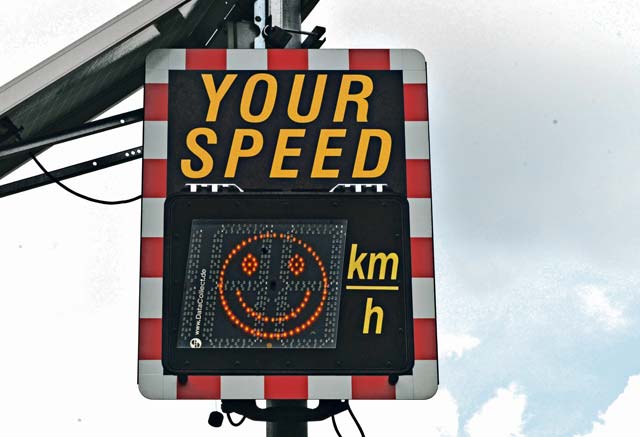
A speed limit sign displays a happy face when motorists adhere to the speed limit at Ramstein Air Base. The 86th Airlift Wing Safety office advises motorists to exercise caution in school zones to avoid potential mishaps.
The school year is approaching, and the 86th Airlift Wing Safety office wants to remind Kaiserslautern Military Community members to advise children on safety concerns during their commute to school.
From parents to top-tier leadership, student safety is a priority.
“Every school year U.S. Department of Defense Education Activity-Europe places safety and security in the highest regard for its students and staff,” said Bill Heiges, DODEA-Europe safety and security officer. “Coordination takes place from (all levels) to ensure all efforts are focused on providing a safe and secure environment for students to learn and achieve success.”
Achieving a safe commute to school starts with educating children on precautions to take.
Staff Sgt. Dave Looby, 86th AW Safety occupational safety craftsman, said conversations about safety have to start at home.
“Give your child the tools to be safe on the road,” Looby said. “It’s important to know the hazards that are associated with traveling on the road (in order to) prevent future mishaps.”
The 86 AW Safety office has important safety reminders for the KMC before the school year begins.
Children Accident and Injury Prevention
In Europe, the traffic does not stop for loading and unloading school buses. Teach your children a lifesaving rule: Never cross the street in front of or behind the bus. In addition to that, look both ways before crossing.
According to SafeKids.org, children are most often hit by cars during the hours before and after school, with a peak in September.
Head Up, Phone Down
In the last 20 years, the death rate for kids of all ages declined more than 50 percent, according to the National Safety Council; however, there has been a large demographic shift with children from ages 5 to 9 to teenagers being the most likely to be struck by a
vehicle.
Safe Kids Worldwide stated one in five high school students and one in eight middle school students cross the street while distracted. With the increased use of handheld devices, distracted walking has become a problem, escalating the chance of being struck by a vehicle. Teach one another to stay attentive to your surroundings. Keep your head up and phone down.
The following are SafeKids.org year-around safety tips to eliminate distracted walking:
• Never walk while texting or talking on the phone
• If texting, move out of the way of others and stop on the sidewalk
• Never cross the street while using an electronic device
• Do not walk with headphones on
• Be aware of the surroundings
• Always walk on the sidewalk if one is available.
If a child must walk on the street, he or she should face oncoming traffic
• Look left, right, then left again before crossing the street
• Cross only at crosswalks
Safety tips for children
• Be on time. Walk, do not run, to the bus stop
• When waiting for the bus, take at least three large steps away from the curb
• Take your seat on the bus and stay in it while the bus is moving. If there are seat belts, buckle up
• When getting off the bus, take three large steps away from the curb and wait for the bus to depart before crossing the street
• Never cross the street in front of or behind the bus
Also, active escorting by responsible caregivers helps promote safety and security.
Safety tips for parents
• Ensure children know and use the safest route possible to and from the bus stop
• Teach children how to use crosswalks, pedestrian crossings and traffic lights
• Dress children with bright clothing, easily visible to motorists
• Teach children to stand on the sidewalk and wait for the bus to depart before attempting to cross the street
• Talk with children about their behavior when riding in a car and on a school bus


